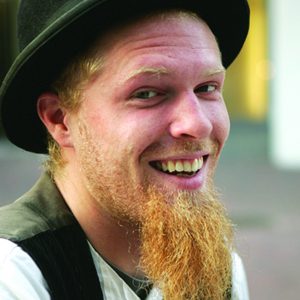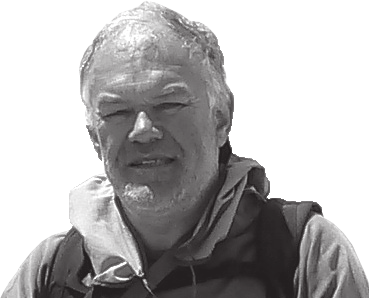Could you introduce yourself briefly to our readers?
Henning Vogt: I work as an educator in child and youth psychiatry in Lübeck. I learned two professions, firstly as a joiner and then as an educator. While I was doing my second training course, I knew that I would go travelling as a journeyman joiner. I set off on 2nd January, 2006.
What is your speciality?
Building furniture from real wood with classical associations.
When did your time as a journeyman start and how did it go?
In Bad Oldesloe, in Northern Germany. That was also the centre of the area I wasn’t allowed to enter. As I knew that I had plenty of time, I spent nine months travelling around Germany and then set off for Switzerland in the autumn, and from there through France to Spain. That was the end of November, and I spent three months in Barcelona, and worked there, doing the interior construction of a travel agent’s. I then came to Portugal via Andalusia, Granada and Cádiz. I spent two months working in the Algarve, in Monchique and in Aljezur. I went back to Germany by bus because I had professional commitments there.
You spent a lot of time walking, where did you sleep?
I crossed the whole of the Algarve on foot, from Tavira through Faro as far as Aljezur. I slept in my sleeping bag on abandoned building sites or in the countryside. I always tried to get a roof over my head, also because it sometimes rained quite heavily. I got a room in both Monchique and Aljezur.
Were there situations that gave you problems?It’s always hard to find a good place to sleep. Faro was like that, as well as other big towns. You want to have a bit of peace at night, and this included finding a safe place. There’s always a risk of being attacked. I just couldn’t find anyone in Faro who said to me, tonight you can sleep at my house.

How did it continue?
I went back to Germany, and the next summer, in 2007, I went to Scandinavia. I went to Norway via Sweden and then returned via Denmark. I found work in Oslo. I kept a journeyman’s log about it, with work references and proof of staying overnight. When you arrive in a town, you introduce yourself to the mayor, who confirms that you were there with a stamp. If you lose your logbook, that is associated with a loss of honour. You simply cannot allow that to happen to you. I once heard about someone who fell into some water and then had to dry the pages one by one. Then in the winter from 2007 to 2008 I was on the road on my own in Switzerland, and working, and I became depressed. I didn’t have any destinations in mind any more, and felt like going home again. But that wasn’t possible. I still had a year left until I was allowed back. Although I had a job, a good place to stay and work, and could choose my food, I had a hard time in Switzerland.
How did you get through that?
Spring arrived and I met someone who I could travel with. Then I set off with him via Italy to Greece. Before that I’d always travelled alone.
A journeyman’s clothing is known as “Kluft” (uniform) in German. How did you manage with that, and what else did you have in your luggage?
After a year, I had to have a new uniform made for me because the trousers were worn out. During my journeyman’s years, I went through two uniforms. One sleeping bag, one sleeping mat, one bivouac sack, one pair of working trousers, three pairs of pants, three t-shirts and three pairs of socks. You’re not allowed to take money with you, but you always earn something during your travels. I also had some cloths with me for wrapping my tools in.
How many kilometres did you cover in the three years and how would you sum it all up?
It’s a fantastic total. I’ve never counted it up. On these journeys, it’s more about understanding between peoples and about learning a bit more professionally. I helped to erect roofs and you have a wide range of experiences. The overall impression is that I never want to travel in uniform again. The uniform represents a lack of freedom. It’s incredibly heavy. It’s made of a cord material which absorbs water when it rains. Over time, it develops a smell like a wet dog. You can’t even wash the uniform. Drying it takes a long time. Although it lasts a long time, it’s not practical. In terms of footwear, I also went through two pairs of shoes. The most important thing for me is that everyone should have the chance to travel. The courage to leave their home country and to discover something new, to learn something new, that really enriches one’s life. On a hike, you find yourself quite naturally when you walk for more than two or three days in a row.
Is there a code of behaviour?
Not leaving any scorched earth behind you, not behaving dishonourably. In German there’s the concept of the “Schlitzohr” (literally “slit-ear”, meaning a person who’s a bit of a rascal or a swindler). That comes from the fact that dishonourable behaviour like theft or similar was punished by tearing a journeyman’s earring out of his earlobe so that everyone could see who they were dealing with. Every journeyman was required to wear a gold earring while travelling.
When you look back, where did you like it most?
That’s hard to say. I liked it a lot in Sweden and in Portugal, and that’s where I was able to fulfil my expectations of my journeyman’s years.
When you travel a lot in Europe, you discover the cuisine of the different countries. Where did you enjoy the food most?
In Portugal.
Thank you.
 Eco123 Revista da Economia e Ecologia
Eco123 Revista da Economia e Ecologia


